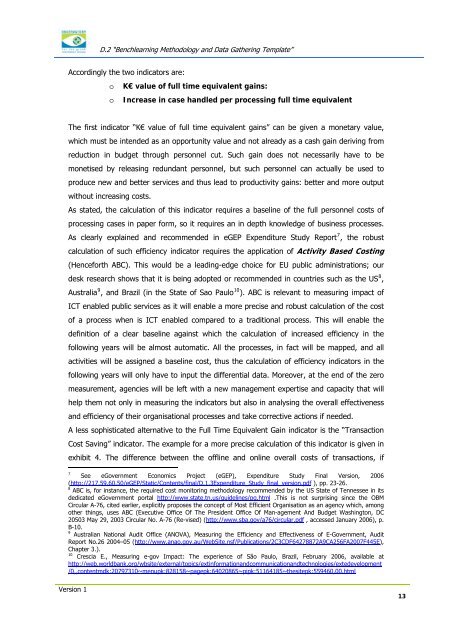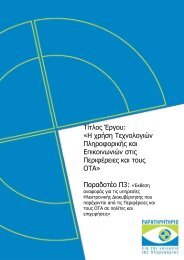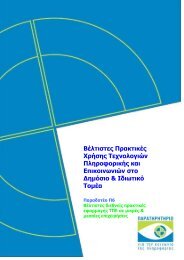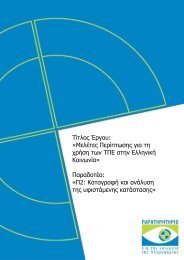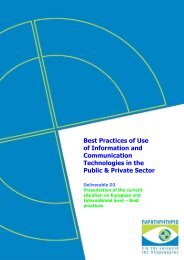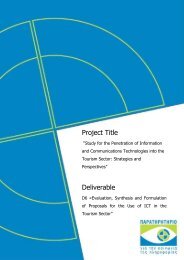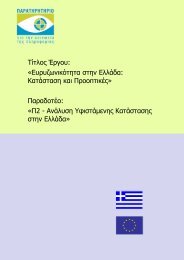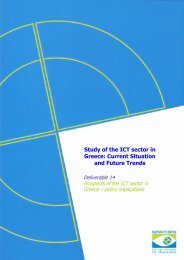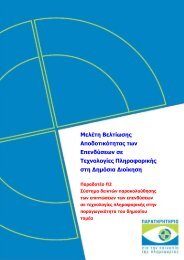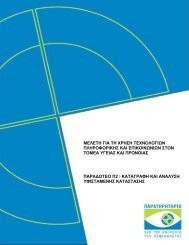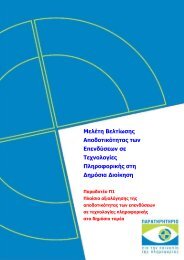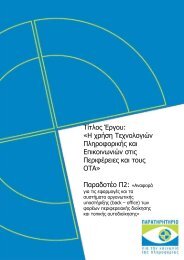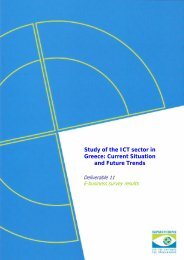Benchlearning methodology and data gathering template
Benchlearning methodology and data gathering template
Benchlearning methodology and data gathering template
- No tags were found...
You also want an ePaper? Increase the reach of your titles
YUMPU automatically turns print PDFs into web optimized ePapers that Google loves.
D.2 “<strong>Benchlearning</strong> Methodology <strong>and</strong> Data Gathering Template”Accordingly the two indicators are:o K€ value of full time equivalent gains:o Increase in case h<strong>and</strong>led per processing full time equivalentThe first indicator “K€ value of full time equivalent gains” can be given a monetary value,which must be intended as an opportunity value <strong>and</strong> not already as a cash gain deriving fromreduction in budget through personnel cut. Such gain does not necessarily have to bemonetised by releasing redundant personnel, but such personnel can actually be used toproduce new <strong>and</strong> better services <strong>and</strong> thus lead to productivity gains: better <strong>and</strong> more outputwithout increasing costs.As stated, the calculation of this indicator requires a baseline of the full personnel costs ofprocessing cases in paper form, so it requires an in depth knowledge of business processes.As clearly explained <strong>and</strong> recommended in eGEP Expenditure Study Report 7 , the robustcalculation of such efficiency indicator requires the application of Activity Based Costing(Henceforth ABC). This would be a leading-edge choice for EU public administrations; ourdesk research shows that it is being adopted or recommended in countries such as the US 8 ,Australia 9 , <strong>and</strong> Brazil (in the State of Sao Paulo 10 ). ABC is relevant to measuring impact ofICT enabled public services as it will enable a more precise <strong>and</strong> robust calculation of the costof a process when is ICT enabled compared to a traditional process. This will enable thedefinition of a clear baseline against which the calculation of increased efficiency in thefollowing years will be almost automatic. All the processes, in fact will be mapped, <strong>and</strong> allactivities will be assigned a baseline cost, thus the calculation of efficiency indicators in thefollowing years will only have to input the differential <strong>data</strong>. Moreover, at the end of the zeromeasurement, agencies will be left with a new management expertise <strong>and</strong> capacity that willhelp them not only in measuring the indicators but also in analysing the overall effectiveness<strong>and</strong> efficiency of their organisational processes <strong>and</strong> take corrective actions if needed.A less sophisticated alternative to the Full Time Equivalent Gain indicator is the “TransactionCost Saving” indicator. The example for a more precise calculation of this indicator is given inexhibit 4. The difference between the offline <strong>and</strong> online overall costs of transactions, if7See eGovernment Economics Project (eGEP), Expenditure Study Final Version, 2006(http://217.59.60.50/eGEP/Static/Contents/final/D.1.3Expenditure_Study_final_version.pdf ), pp. 23-26.8 ABC is, for instance, the required cost monitoring <strong>methodology</strong> recommended by the US State of Tennessee in itsdedicated eGovernment portal http://www.state.tn.us/guidelines/pg.html .This is not surprising since the OBMCircular A-76, cited earlier, explicitly proposes the concept of Most Efficient Organisation as an agency which, amongother things, uses ABC (Executive Office Of The President Office Of Man-agement And Budget Washington, DC20503 May 29, 2003 Circular No. A-76 (Re-vised) (http://www.sba.gov/a76/circular.pdf , accessed January 2006), p.B-10.9 Australian National Audit Office (ANOVA), Measuring the Efficiency <strong>and</strong> Effectiveness of E-Government, AuditReport No.26 2004–05 (http://www.anao.gov.au/WebSite.nsf/Publications/2C3CDF64278872A9CA256FA2007F445E),Chapter 3.).10Crescia E., Measuring e-gov Impact: The experience of São Paulo, Brazil, February 2006, available athttp://web.worldbank.org/wbsite/external/topics/extinformation<strong>and</strong>communication<strong>and</strong>technologies/extedevelopment/0,,contentmdk:20797310~menupk:828158~pagepk:64020865~pipk:51164185~thesitepk:559460,00.htmlVersion 113


